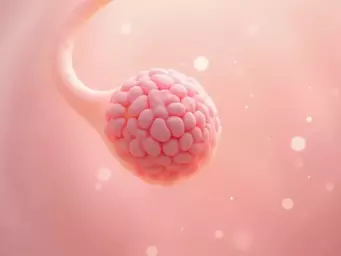Common Cyst Types
- •Functional Cysts: Most common, linked to menstrual cycle.
- •Dermoid Cysts: Can contain various tissues.
- •Endometriomas: Caused by endometriosis, often painful.
Posted on: 2025-10-20
By: Edyta Drabek
What if understanding your body could empower you to manage your health more effectively? Ovarian cysts are more common than many women realize, yet knowledge about them can significantly improve your quality of life. Let's explore the essential insights that will help you navigate this journey with confidence.
Understanding ovarian cysts involves recognizing their common types and the proactive steps for managing them. This summary highlights different cyst classifications and key approaches to maintaining hormonal balance and overall well-being.
Understanding ovarian cysts can feel overwhelming, especially when you're navigating discomfort on your own. At Ovarian Cysts Wellness, we believe knowledge is empowering! Let’s take a moment to break this down together and explore what ovarian cysts are and how they can affect your health.
Ovarian cysts are fluid-filled sacs that develop on your ovaries. Many women will experience them at some point in their lives, often without even realizing it! While most cysts are benign and cause no symptoms, they can sometimes lead to discomfort or complications. For more information on the characteristics of ovarian cysts, you can refer to research on ovarian cyst characteristics and clinical aspects.
Recognizing the type of cyst you have can help in managing symptoms and determining the best approach for treatment or lifestyle adjustments. Remember, you are not alone in this journey.
Identifying the symptoms of ovarian cysts is crucial for managing your health. Common symptoms include:
If you're experiencing any of these symptoms, it’s important to consult a healthcare provider for proper diagnosis. They may use a pelvic exam or imaging tests, like ultrasounds, to help identify the presence of cysts. Timely diagnosis is key to effective management.
Hormonal imbalances can play a significant role in the development of ovarian cysts. Fluctuations in hormones, especially estrogen and progesterone, can lead to the formation of functional cysts. By understanding this connection, you can take proactive steps towards achieving hormonal balance. The importance of hormonal regulation in various health conditions, including ovarian cysts, is a growing area of research, as highlighted in studies on hormonal regulation and its systemic effects.
By focusing on these areas, you can create a supportive environment for your body, making it easier to manage ovarian cysts and improve your overall well-being.
Did you know? Keeping a symptom diary can help you and your healthcare provider identify patterns related to your ovarian cysts. Note down any discomfort, changes in your menstrual cycle, and lifestyle factors like diet and stress levels. This information can be invaluable in tailoring your treatment plan and achieving better hormonal balance.
Understanding when to seek medical attention for ovarian cysts is crucial for your health and well-being. While many cysts are benign and resolve on their own, there are warning signs that shouldn't be ignored. It's essential to listen to your body and recognize when something feels off.
If you experience symptoms like severe pelvic pain, persistent discomfort, or unusual bleeding, it's time to consult a healthcare professional. Early detection can make a significant difference in managing your condition effectively.
There are specific symptoms that indicate it’s time to seek medical assistance. These can include:
It’s important to take these signs seriously. If you notice any of these symptoms, don’t hesitate to reach out to your healthcare provider. They can perform the necessary tests to ensure your safety and guide you through your treatment options. For further details on the importance of early diagnosis and specific warning signs, you can review expert insights on pharmacological approaches to gynecological conditions.
Regular check-ups play a vital role in maintaining your overall health, especially if you have a history of ovarian cysts. Your doctor can monitor any changes and help you manage your symptoms effectively. During your visits, discussing any concerns or new symptoms is essential.
Having a solid plan for regular assessments can bring peace of mind. You can discuss:
These proactive steps can help you stay informed and empowered on your health journey, allowing you to address potential issues before they escalate.
Now that you’re aware of when to seek help and the importance of monitoring your health, let's talk about how to take action for your well-being. Small, manageable changes can lead to significant improvements in your quality of life.
Here are some simple steps you can implement today:
Taking these steps can help you feel more in control of your health. By making gradual adjustments, you can pave the way towards a more balanced lifestyle.
Women’s health is a multifaceted journey, and it's crucial to adopt a balanced approach. This means considering not just physical health, but also emotional and mental wellness. Remember, it’s perfectly okay to ask for help along the way!
Engaging with resources from Ovarian Cysts Wellness and connecting with our community can provide you with additional insights and support. We’re here to encourage you every step of the way!
Health coaching can be an invaluable resource in your journey towards wellness. A coach can help you set realistic goals, hold you accountable, and provide you with the tools needed to make sustainable changes.
Whether you're looking to enhance your diet, improve your exercise routine, or manage stress more effectively, a health coach can tailor strategies that work for you. Together, we can navigate your unique path towards health and happiness.
Here is a quick recap of the important points discussed in the article:



 Understanding ovarian cysts can feel overwhelming, especially if you're navigating discomfort on you
Understanding ovarian cysts can feel overwhelming, especially if you're navigating discomfort on you
 Building your personalized self-care kit can be a transformative experience, especially during chall
Building your personalized self-care kit can be a transformative experience, especially during chall
 Many women are unaware that ovarian cysts are a common issue, with many experiencing them at some po
Many women are unaware that ovarian cysts are a common issue, with many experiencing them at some po